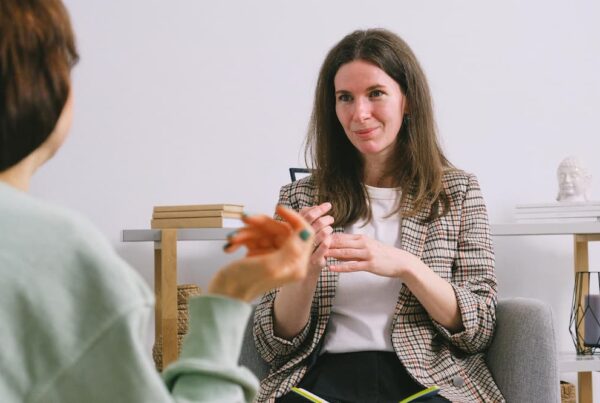Attending regular therapy sessions can help you achieve your goals to become the best version of yourself – but it doesn’t happen after just one session.
It could take months or even years of sessions to achieve your therapy goals, depending, of course, on what you’re attending therapy for.
During your first therapy session, you may feel overwhelmed and try to get the most out of your session, and you may end up not really saying anything at all.
So, in today’s blog, we will talk you through what you can expect at therapy, and how you can begin to talk about your problems with your therapist so that you can start your journey to a healthier and happier life!
Why Consider Therapy?
If you have underlying mental health problems, you may benefit from therapy – therapy provides a safe space where you feel comfortable talking about what you are struggling with.
Therapy can help you to overcome past trauma and childhood experiences – and also help you to understand more about yourself.
Therapy is great for personal growth, and will lead to a more fulfilling life, once you have created techniques that will help you long term to become a better person.
Here are some more reasons to consider therapy:
- You experience low mood or frequent changes in mood
- You experience anxious thoughts and feelings
- You struggle with low self-esteem
- You’re going through a major life change
- You have a mental health condition
- You want to recover from addiction
What to Expect at Therapy
Understanding what you can expect at therapy can help you towards your decision to begin sessions. Therapy can cost anything from £80 to over £200 per session.
Discovering what your first session will be like, what your therapist may ask you or what you may need to ask can help you to prepare yourself ahead. Let’s take a look:
Your First Therapy Session
The first therapy session will be for you and your therapist to get to know each other. Your therapist will identify whether they think they have the right skills and experience to support you through recovering from past experiences. You can also consider whether you think the therapist is the right therapist for you.
It’s important that you don’t avoid talking about certain things that trouble you – your therapist is there to support you and to begin making progress. To get the most out of therapy, you should try to be open and honest about your feelings.
Your therapist will understand that starting therapy can be a difficult step in your journey – remember that they are experienced, and you are in safe hands.
What to Talk About in Therapy
You may wonder what you can talk about in therapy and how you can make your therapist understand what you are going through. Your therapist is there to help you to make positive changes in your life. But what are some conversation starters?
Talk About Childhood Experiences
Past experiences from your childhood can play a part in your mental state as an adult. If you have any trauma from your childhood, you should be open to bringing it up with your therapist. This will help your therapist to identify the root cause of your current mental health conditions.
Talk About How You Are Currently Feeling
Discuss how you are currently feeling. How do you feel about starting therapy? Has anything happened today that’s upset you, or triggered negative reactions? If you’re in addiction therapy, how is this going? Are you experiencing any obstacles in maintaining sobriety?
How Do You Currently Manage Your Emotions
Tell your therapists the techniques and ways you manage your feelings (if you have any). Do they work? How do these techniques make you feel? Are there any unhealthy ways that you manage your symptoms, such as substance use? What are they?
Talk About Your Life Goals
It’s all good and well to tell your therapist what troubles you, but you could also discuss your life goals, what you want to get out of life and where you want to be in the future.
Your therapist is there to help you to overcome your problems and work through your emotions, finding ways for you to manage your symptoms. They are helping you to become the best version of yourself, and the best version of yourself reaches their goals.
Talk About Your Daily Routine
Your daily routine plays a bigger role than you think when it comes to your mental health. Do you take out enough time for yourself each day? Do you do things you enjoy?
Your therapist will help you to create a daily routine that helps you get the most out of each day, motivating you to stay on track with your journey. They can empower you to break unhealthy patterns.
Talk About What You Want to Gain From Therapy
Where are you hoping to be when it is time to stop therapy? What do you want to get out of each session and how are you hoping therapy will make you feel?
Once your therapist understands what exactly you want to gain from therapy, they will be able to work closely with you to reach your treatment goals and plan future sessions that will give you effective coping skills.
Is There a Link Between Mental Health Conditions and Addiction?
Yes – research shows a link between underlying mental health conditions and addiction. People who struggle with poor mental health may be more likely to use drugs or alcohol to cope with how they feel.
To overcome your addiction, you must address the mental health conditions and find ways to manage them to avoid circling back to bad habits.
Addiction Therapy With Rehubs
Here at Rehubs, we can help you to overcome your mental health condition and recover from addiction in the comfort of your own home, with our at-home programs.
Our online programs are a great way for you to overcome your addiction and make a long-term recovery. Our online platform is easily accessible and flexible – and your treatment plan is designed to suit you.
Access your online therapy anytime anywhere, and receive help and guidance from our specialists, attend weekly sessions remotely and daily group sessions, where you can talk to others who relate to you.
Are you ready to change your life? Complete your free consultation form today and a member of our team will be in touch.







